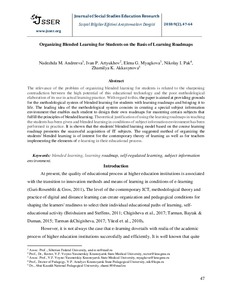Organizing Blended Learning for Students on the Basis of Learning Roadmaps
Скачать файл:
URI (для ссылок/цитирований):
http://jsser.org/article/view/5000215685/5000184002https://elib.sfu-kras.ru/handle/2311/110811
Автор:
Nadezhda M. Andreeva
Ivan P. Artyukhov
Elena G. Myagkova
Nikolay I. Pak
Zhamilya K. Akkasynova
Коллективный автор:
Институт математики и фундаментальной информатики
Базовая кафедра вычислительных и информационных технологий
Дата:
2018Журнал:
Journal of Social Studies Education ResearchКвартиль журнала в Scopus:
Q3Библиографическое описание:
Nadezhda M. Andreeva. Organizing Blended Learning for Students on the Basis of Learning Roadmaps [Текст] / Nadezhda M. Andreeva, Ivan P. Artyukhov, Elena G. Myagkova, Nikolay I. Pak, Zhamilya K. Akkasynova // Journal of Social Studies Education Research. — 2018. — 2018:9(2).Аннотация:
The relevance of the problem of organizing blended learning for students is related to the sharpening
contradiction between the high potential of this educational technology and the poor methodological
elaboration of its use in actual learning practice. With regard to this, the paper is aimed at providing grounds
for the methodological system of blended learning for students with learning roadmaps and bringing it to
life. The leading idea of the methodological system consists in creating a special subject information
environment that enables each student to design their own roadmaps for mastering certain subjects that
fulfill the principles of blended learning. Theoretical justification of using the learning roadmaps in teaching
the students has been given and blended learning in conditions of subject information environment has been
performed in practice. It is shown that the students' blended learning model based on the course learning
roadmap promotes the successful acquisition of IT subjects. The suggested method of organizing the
students' blended learning is of interest for the contemporary theory of learning as well as for teachers
implementing the elements of e-learning in their educational process.
Коллекции:
Метаданные:
Показать полную информациюСвязанные материалы
Показаны похожие ресурсы по названию, автору или тематике.
-
U-LEARNING - ПОВСЕМЕСТНОЕ ЭЛЕКТРОННОЕ ОБУЧЕНИЕ В XXI ВЕКЕ: НА ПУТИ К КОННЕКТИВИЗМУ И СМАРТ-ОБРАЗОВАНИЮ
Симонова, А. Л.; Ломаско, П. С.; Simonova, A. (Сибирский федеральный университет, 2016-04-14)В статье описываются современные тенденции изменений в области информационных технологий с позиций их потенциала для реализации моделей электронного и смешанного обучения в высшей школе. Раскрываются направления совершенствования ... -
Eportfolio Technology in Evaluation of Students’ Formal, Non-Formal and Informal Learning, Accreditation of Educational Programs and Development of E-Learning in a Federal University
Безызвестных, Е. А.; Смолянинова, О. Г. (2016-03) -
EPORTFOLIO TECHNOLOGY IN EVALUATION OF STUDENTS' FORMAL, NON-FORMAL AND INFORMAL LEARNING, ACCREDITATION OF EDUCATIONAL PROGRAMS AND DEVELOPMENT OF E-LEARNING IN A FEDERAL UNIVERSITY
Смолянинова, Ольга Георгиевна; Безызвестных, Екатерина Анатольевна (2016-10) -
УПРАВЛЕНИЕ BLENDED LEARNING В УНИВЕРСИТЕТЕ
Андрюшкова, О. В.; Andryushkova, O. V. (Сибирский федеральный университет, 2016-04-14)Аннотация: в докладе рассматривается опыт применения комбинированного обучения в преподавании естественнонаучных и педагогических дисциплин по образовательным программам высшей школы. Показано, что в соответствии с ... -
Developing Language Competency of University Teachers to Implement Content and Language Integrated Learning (CLIL) in a Regional University: Challenges and Prospects
Godzhaeva, Natalia S.; Logunov, Timur A.; Годжаева, Н.С.; Логунов, Т.А. (Сибирский федеральный университет. Siberian Federal University., 2015-11)A fundamental flaw in FL training is the fact that it is based either mostly on the principles of General Language, thus leaving graduates unprepared for their occupational-specific language needs, or predominantly ...

